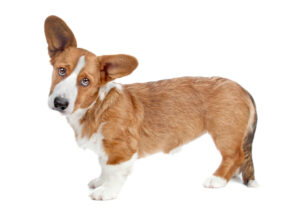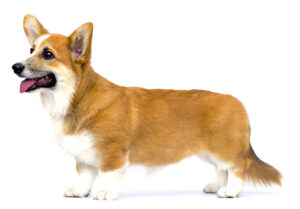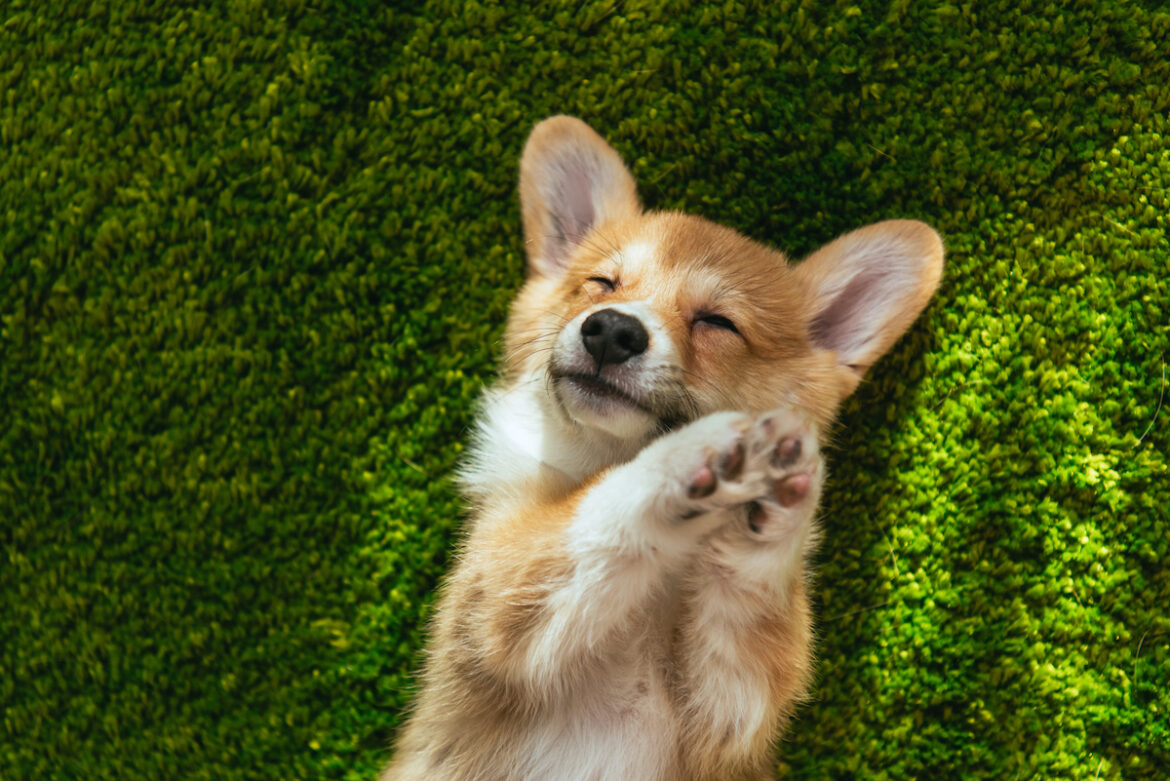Dorgi and corgi dogs both originate from the United Kingdom, and they look quite similar at first glance. With them looking so similar, and their names sounding pretty much the same, it can be easy to confuse the two!
While they are similar and have some similar traits and characteristics, they are different dogs, so knowing the difference between the two will help you identify them better and maybe even choose which would be a better fit for your home.
What is the difference between a dorgi and a corgi? A dorgi is a dachshund corgi mix that grows to be slightly smaller than a corgi, and weighs a little bit less too. A dorgi would have a short and smooth coat, whereas a corgi would have a short to medium-length dense coat. Both are affectionate, loving dogs, who are fairly low maintenance.
There are many similarities between the two breeds, but also significant differences. Read on to find out more about how a dorgi and a corgi differ!
The History Of Dorgis
Dorgi dogs came about as a designer breed. The exact crossbreed origins are not entirely known, but generally, a dorgi is a mix between a Pembroke Welsh corgi and a dachshund. As it is a fairly new breed, there is not much length to the history of a Dorgi, but the breeds it originates from have been around for quite some time.
The dorgi originated in the United Kingdom, with the dachshund coming from Germany and the corgi coming from the United Kingdom too. The mix between these two breeds gives the dorgi a unique body shape and coloring, with a mix of different colors on its coat. This relatively new breed has ancestors with quite a long history!
The Appearance Of Dorgis

Dorgis have a long body for their size, along with short legs. This makes them look very similar to a corgi, as well as sharing the same erect ears too!
A dorgi will grow to be between 20cm to 30cm in length and weigh between 6kg and 12kg. They are considered small breed dogs.
As they are a cross between a dachshund and a corgi, dorgi dogs are sometimes referred to as sausage dogs, but the similarities they share with dachshunds do vary depending on which traits they have inherited more from their ancestors.
A dorgi might look more like a corgi or more like a dachshund, and this can affect body shape, coat, and even temperament. Like corgis, they will be born with long tails that may be docked to fit breed standards.
The color of dorgis varies as well, ranging from tan to brown, or even black to white, and some even have a mixture of these colors!
As there is a mix of the breed involved to make dorgis, you can never be one hundred percent sure of what you might get, and you’ll need a bit of luck to find the colors and shape you’d prefer in your pet.
The Temperament Of Dorgis
Dorgis are such wonderful dogs to have. They are full of life and love the attention they get from their family. They are loyal, fun, and playful.
It is worth noting that dorgis are quite energetic, and do need stimulation to keep active and happy. They will very willingly participate in any games in the home and play with other pets inside the house as well.
As they are an energetic breed, dorgis do need to be trained and socialized from a young age. This can be easy as they are an intelligent breed and pick up on things quickly. With training, they can be obedient and relaxed and know when to be energetic and when to take it slow.
Dorgis make for really great pets in the right home. They are wonderful companions and are very affectionate to their families. They don’t like to be left alone, so are ideal for bigger families or someone who is looking for a constant companion.
Although small, dorgis are also protective and will do what they can to protect their family!
Dorgi Health Problems
Dorgis are a crossbreed, which means they are considered healthy and don’t suffer too many health problems. Both corgis and dachshunds have specific health problems, so there is a chance that a dorgi might inherit one or two of these health issues.
These are the two health problems that a dorgi might encounter:
- Diabetes
Dorgis can suffer from diabetes, and it can be a serious health issue. If too much sugar builds up in a dorgis blood, it could do damage to their eyes, heart, and kidneys. This might present at first as the dorgi gaining weight, being more lethargic, having cloudy eyes, and being thirsty more often.
Dogs can have insulin shots, so it is a disease that can be managed, but it can also be prevented at times with a controlled, low-sugar diet.
- Obesity
Obesity is a real issue for smaller dogs, and with dorgis this is made more difficult as they have shorter legs supporting their body.
If obese, dorgis could suffer from diabetes, high blood pressure, and osteoarthritis. Obesity can be avoided by only giving a dorgi a healthy diet that is recommended by a veterinarian. Too much sugar and fat in their diet can very quickly lead to them being overweight.
Caring For A Dorgi
Dorgis are easy enough to care for and are not high maintenance. They have a short coat that does not shed often. They simply need to brush their coat once or twice a week to keep it healthy and shiny.
When it comes to exercise, a dorgi needs regular exercise. They need to be taken on regular walks, and it is especially helpful if you have a small garden for them to play in.
Their diet needs to be healthy and balanced and should consist of high-quality dog food. It is always worth speaking to your vet to find the best diet for your dorgi.
A dorgi needs lots of love and attention and thrives off of a connection with their family. Busy families who do not have time to commit to their dog should probably not bring a dorgi home, as they could feel deprived and lonely.
It does not matter if the dorgi is in a home with one person or a big family, they will be happy as long as they have good love and affection.
The History Of Corgis
Corgi dogs have been around much longer than dorgis. At their beginning, corgis were a cattle herding dog breed, who originated in Pembrokeshire in Wales. There are two main types of corgi breeds – the Welsh corgi and the Cardigan Welsh corgi.
The word corgi originates from “korgi”, which means dwarf dog. This is due to their short little legs and long body.
In 1934, the Pembrokeshire corgi was officially recognized by the United Kingdom Kennel Club. This breed is considered separate to the Cardiganshire corgi.
Pembrokeshire corgis are the Queen of England’s breed of choice!
The Appearance Of Corgis

Corgis are considered small to medium size dogs and are most often larger than dorgis. Mature corgis can grow to between 25-30cm and weigh anywhere between 10-14kg.
Corgis have a short to medium-length coat which is quite thick. They can have a few different color coats, from red, fawn, tan, and even black, which are often accompanied by white markings.
The face of a corgi is quite sharp, with an extended snout. Their low-set, long body is held up by short little legs, but this just makes them sturdy and strong.
The ears of a corgi are erect, and their tails are docked. They have a very distinctive body shape and coat color, which makes them very easy to identify!
The Temperament Of Corgis
Corgis make for great pets too. Each corgi has their own personality, but generally, they are fun, happy, and smart dogs.
A corgi does need training from a young age, and socializing too. They are smart, but they are also stubborn, so they need proper guidance from puppyhood.
A well-trained, socialized corgi makes an amazing pet. They are happy and fun and love to play. A corgi will be very loyal to its family, which is what makes them such good companions.
Corgis love to be active and do require exercise. While only needing a moderate amount of exercise, they won’t mind at all being part of a more active family.
As they are intelligent and easy to train, they can be the perfect dog for first-time owners and are suitable to live in the countryside or the city, as long as they have their own space to play and explore and are given enough attention to keep them stimulated.
Without training, a corgi might be a little too stubborn and too active, which can be difficult to deal with, especially in a smaller home.
Corgi Health Problems
Corgis can enjoy a long and healthy life, but being purebred, there are some health problems that they might be more susceptible to.
A corgi needs to be on a healthy, balanced diet, to ensure that they do not put on too much weight and become obese, which could lead to numerous health issues.
Here are some of the most common health problems that corgis experience:
- Hip Dysplasia
Hip dysplasia happens where the joints lose proper contact with each other, and this can lead to severe pain for corgis. Many people think that hip dysplasia might only occur in older corgis, but it can happen to young dogs too.
This health problem does need to be addressed by a vet, or else it might cause a corgi to lose their ability to walk.
- Degenerative Myelopathy
Degenerative Myelopathy is a serious condition that can cause corgis to lose coordination of their hind limbs, and eventually degenerate so much that the corgi can no longer walk.
Along with losing their ability to walk, a corgi might become incontinent too. This is such a horrible disease, as there is not much that can be done to stop the progression. The main form of treatment is just controlling the symptoms and making a corgi more comfortable wherever possible.
Caring For A Corgi
Corgis have a short to medium-length coat that does not shed much. They need their coats brushed through twice a week to keep them in the best condition.
A corgi needs to be given regular exercise and the ability to explore and sniff out their surroundings. They are energetic dogs and need to be allowed to burn the energy off each day. They are particularly fond of ball games too!
Corgis burn through a lot of calories, being so active, so they will need a diet rich in protein and the energy they need to keep going. It is once again worth speaking to your vet to find the perfect diet for your corgi, to ensure they are given everything they need!
Summary Of Corgis And Dorgis
Dorgis were made as designer dogs, like a blend between dachshunds and corgis. They are low-maintenance and happy-go-lucky dogs. Dorgis tend to be full of energy and personality and are loyal and loving to their owners. They fit in well with families with young children too and will adapt to a household of pets.
Dorgis do need to be trained and socialized from a young age, but as they are intelligent, this isn’t very difficult to do.
A dorgi in the home is a ray of sunshine and fun, and only families who have the time and patience to give a dorgi love and affection should consider bringing one home!
The Queen’s favorite breed, corgis are also wonderful pets. Their long bodies and short legs make them ridiculously cute, but they are very strong and robust dogs too, originally being used as cattle herders.
Corgis are very loyal dogs who fit into a family well. They will bring lots of love, happiness, and affection to a family, and get along well with kids too.
They make for a great companion, as they are loyal and devoted, but they do need to be given the same attention back!
Dorgis Vs Corgis
Dorgis and corgis are two different breeds that share many of the same characteristics. Dorgis are a mix of dachshund and Welsh Pembrokeshire corgi, whereas a corgi is a purebred. This mix does give them a slightly different appearance and personality from each other.
The two are great dogs to introduce to a home and are full of love and life. They are intelligent and require some exercise to burn off their energy, but they will both soon become a very important member of the family!
Related Questions
Can Corgis be difficult?
If a corgi is not given enough exercise, it can be difficult to tire out. Initially, corgis worked in the field all day, herding livestock and running constantly. They still maintain this high level of energy and need to be cared for in a way that allows them to burn this off.
If they do not get regular exercise, a corgi might then turn to destructive behaviors, such as biting, chewing, and barking.
Are Corgis aggressive?
Corgis are not necessarily aggressive dogs, but they can be stubborn and bossy. It is so important to train and socialize a corgi from a young age so that they do not fall back on these behaviors, and they learn how to appropriately act around people and other pets.
Up Next: When Do Corgis Stop Growing?
